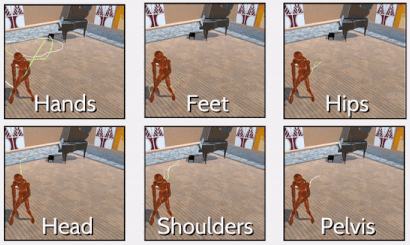Emotion analysis and classification: Understanding the performers' emotions using LMA entities

Emotion analysis and classification: Understanding the performers' emotions using LMA entities
Andreas Aristidou, Panayiotis Charalambous, Yiorgos Chrysanthou
Computer Graphics Forum, 34(6): 262-276, 2015.
Presented at Eurographics 2016.
First published: 20 April 2015
We proposed a variety of features that encode characteristics of motion, in terms of Laban Movement Analysis, for motion classification and indexing purposes. Our framework can be used to extract both the body and stylistic characteristics, taking into consideration not only the geometry of the pose but also the qualitative characteristics of the motion. This work provides some insights on how people express emotional states using their body, while the proposed features can be used as alternative or complement to the standard similarity, motion classification and synthesising methods.
The dance motion capture data used can be downloaded from the Dance Motion Capture Database website.
Other Related Publications
- Feature extraction for human motion indexing of acted dance performances
In Proceedings of the 9th International Conference on Computer Graphics Theory and Applications (GRAPP'14), pages 277-287, Portugal, January 05-08, 2014.
[DOI] [paper] [bibtex] - Motion indexing of different emotional states using LMA components
In SIGGRAPH Asia Technical Briefs (SA'13), ACM, New York, USA, 21:1-21:4, 2013.
[DOI] [paper] [bibtex] - Emotion Recognition for Exergames using Laban Movement Analysis
In Proceedings of ACM Motion in Games (MIG'13), Ireland, November 7-9, 2013.
[DOI] [paper] [bibtex]
Abstract
The increasing availability of large motion databases, in addition to advancements in motion synthesis, has made motion indexing and classification essential for better motion composition. However, in order to achieve good connectivity in motion graphs, it is important to understand human behaviour; human movement though is complex and difficult to completely describe. In this paper, we investigate the similarities between various emotional states with regards to the arousal and valence of the Russell's circumplex model. We use a variety of features that encode, in addition to the raw geometry, stylistic characteristics of motion based on Laban Movement Analysis (LMA). Motion capture data from acted dance performances were used for training and classification purposes. The experimental results show that the proposed features can partially extract the LMA components, providing a representative space for indexing and classification of dance movements with regards to the emotion. This work contributes to the understanding of human behaviour and actions, providing insights on how people express emotional states using their body, while the proposed features can be used as complement to the standard motion similarity, synthesis and classification methods.
Acknowlegments
This work is co-financed by the European Regional Development Fund and the Republic of Cyprus through the Research Promotion Foundation under contract ΔΙΔΑΚΤΩΡ/0311/73.

© 2025 Andreas Aristidou